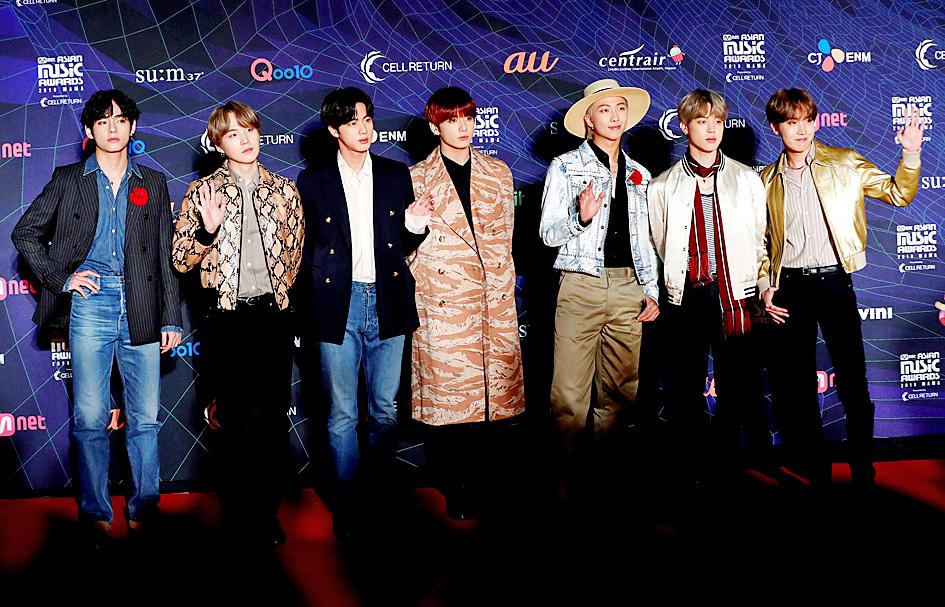Big Hit Entertainment, the management label of hugely popular South Korean K-pop group BTS, yesterday priced its initial public offering (IPO) at the top of its range, as hopeful buyers chased South Korea’s largest listing in three years.
Institutional investors expressed interest in more than 1,000 times the number of shares on offer, with Big Hit riding on the success of the seven-member band, which has become the first South Korean group to reach No. 1 on the US Billboard Hot 100 singles chart with the song Dynamite.
An army of retail investors, known in South Korea as Ants, is also clamoring to buy stock, while die-hard BTS fans are bidding in hopes of securing even one share in what analysts expect to be the country’ hottest listing this year.

Photo: Reuters
Big Hit priced the IPO at 135,000 won per share, it said in a regulatory filing, the top of an indicative price range of 105,000 to 135,000 won announced earlier this month.
Some 1,420 institutional investors sought shares in pre-subscription offers, looking for 1,117 times the number available, the filing said.
About 98 percent said that they would pay the top-range price or more.
“Big Hit is classified as a kind of global export firm,” Yuanta Securities Korea Co analyst Park Sung-ho said.
“Not only has it proven its ability to use YouTube, social media for smart market infiltration, it has fandom platform Weverse which gives unprecedented clarity and control over its revenue sources for a label, and might grow into a true platform player as outside artists increasingly join,” Park said.
Big Hit reported a 49.7 billion won (US$42.4 million) profit for the first half of this year as its online concert and merchandise sales on the Weverse app more than offset event cancelations during the COVID-19 pandemic.
The IPO would make the seven BTS members multimillionaire stockholders, as Big Hit CEO Bang Si-hyuk last month gave them 68,385 shares each, worth nearly US$7.9 million at the issue price.
The firm would raise 962.6 billion won through the offer of 7.13 million new shares, the biggest South Korean IPO since Celltrion Healthcare Co raised 1 trillion won in 2017.
The pricing values Big Hit at about 4.8 trillion won, taking into account common shares plus redeemable preferred shares that would be converted into common shares upon the IPO.
With plenty of liquidity in the market, some analysts predict gross bids from retail investors could hit 100 trillion won.
The central bank is watching the offer closely as a massive oversubscription for shares could send ripples through short-term money markets.
Institutional and retail investors’ subscriptions are due on Monday and Tuesday next week and Big Hit is expected to list on the KOSPI on Oct. 15.

The US dollar was trading at NT$29.7 at 10am today on the Taipei Foreign Exchange, as the New Taiwan dollar gained NT$1.364 from the previous close last week. The NT dollar continued to rise today, after surging 3.07 percent on Friday. After opening at NT$30.91, the NT dollar gained more than NT$1 in just 15 minutes, briefly passing the NT$30 mark. Before the US Department of the Treasury's semi-annual currency report came out, expectations that the NT dollar would keep rising were already building. The NT dollar on Friday closed at NT$31.064, up by NT$0.953 — a 3.07 percent single-day gain. Today,

‘SHORT TERM’: The local currency would likely remain strong in the near term, driven by anticipated US trade pressure, capital inflows and expectations of a US Fed rate cut The US dollar is expected to fall below NT$30 in the near term, as traders anticipate increased pressure from Washington for Taiwan to allow the New Taiwan dollar to appreciate, Cathay United Bank (國泰世華銀行) chief economist Lin Chi-chao (林啟超) said. Following a sharp drop in the greenback against the NT dollar on Friday, Lin told the Central News Agency that the local currency is likely to remain strong in the short term, driven in part by market psychology surrounding anticipated US policy pressure. On Friday, the US dollar fell NT$0.953, or 3.07 percent, closing at NT$31.064 — its lowest level since Jan.

The New Taiwan dollar and Taiwanese stocks surged on signs that trade tensions between the world’s top two economies might start easing and as US tech earnings boosted the outlook of the nation’s semiconductor exports. The NT dollar strengthened as much as 3.8 percent versus the US dollar to 30.815, the biggest intraday gain since January 2011, closing at NT$31.064. The benchmark TAIEX jumped 2.73 percent to outperform the region’s equity gauges. Outlook for global trade improved after China said it is assessing possible trade talks with the US, providing a boost for the nation’s currency and shares. As the NT dollar

The Financial Supervisory Commission (FSC) yesterday met with some of the nation’s largest insurance companies as a skyrocketing New Taiwan dollar piles pressure on their hundreds of billions of dollars in US bond investments. The commission has asked some life insurance firms, among the biggest Asian holders of US debt, to discuss how the rapidly strengthening NT dollar has impacted their operations, people familiar with the matter said. The meeting took place as the NT dollar jumped as much as 5 percent yesterday, its biggest intraday gain in more than three decades. The local currency surged as exporters rushed to